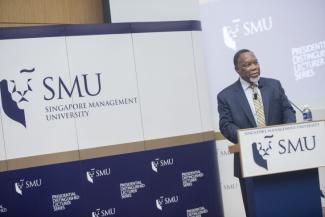
“Education remains the greatest equalizer in the history of modern society. When we educate people, we provide them with tools and means not only to analyse challenges facing society, but also to extricate themselves from their miserable social conditions,” said Mr Kgalema Motlanthe at the Presidential Distinguished Lecturer Series at Singapore Management University on 31 October 2017.
Mr Motlanthe was President of the Republic of South Africa from 2008-2009. He served as Secretary General of the African National Congress from 1997 to 2007, and continued as its Deputy President till 2012. He currently serves as Chair of the High Level Panel on the Assessment of Key Legislation and the Acceleration of Fundamental Change as well as Chancellor of the University of Venda, South Africa.
Speaking to about 200 students, diplomats, government officials and the SMU Community, Mr Motlanthe provided an account of the historical forces which shaped the social-economic contours of the current South African society.
He paid particular attention to the current teaching of science and mathematics in the country. “Progress in moving the country out of the doldrums is predicated on investment in science and technology, from the basic education level all the way to tertiary institutions, so as to equip the coming generation with the necessary tools to launch society into fully-fledged modernity,” he said.
Hampered by the policies of the apartheid era, black South Africans suffered from a lack of education opportunities, and the outcome was especially glaring, as seen in the small number of black South Africans who are engineers and mathematicians as a proportion of its total population compared to other races. South Africa has been placed among the lowest-ranking nations in terms of mathematics and science by the World Economic Forum’s latest global information technology report. “What this means is that the country is not making progress in the knowledge-based domain that has the promise to lift it out of years of stagnation and underdevelopment.” He cited legacies of poor teaching of mathematics and science and insufficient number of such teachers as reasons for the current state of affairs.
Mr Motlanthe said that science and technology can create ‘the advantage of backwardness’, where backward societies harness the progress in scientific innovations to advance their own social development without going through the growing pains which the more advanced societies had undergone. As such, the government and its social partners have the responsibility “to pay attention to the education of our people with a particular focus on primary and secondary school levels. We need to do much more to mobilise all the resources within our reach for the task of producing quality education for both teachers and learners alike. Only a sound and quality education system with strong emphasis on science and mathematics, can serve as a reliable feeder for tertiary institutions which will in turn be able to produce top-notch graduates geared to the needs of the country.”
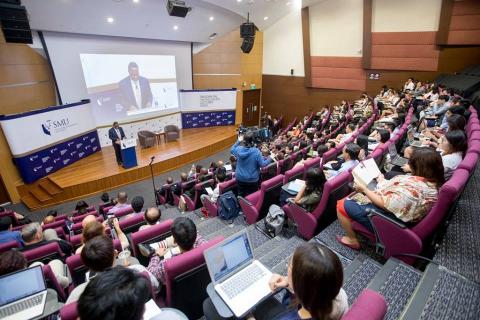
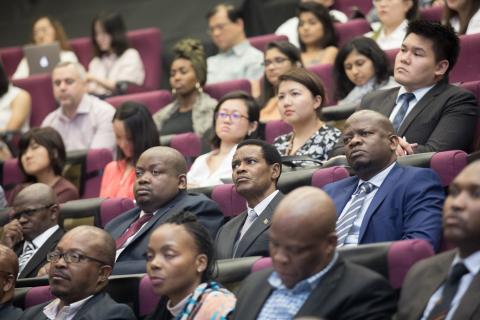
Turning to the role that universities has in lifting South Africa’s development and reconstruction, Mr Motlanthe asked how will South Africa’s universities define themselves in relation to key issues facing tertiary education and society, and how will the universities wrestle with the pre-1994 race-class nexus that characterise South African polity.
He remarked that more than any other social forces, the universities are well positioned to contribute to South Africa’s competitive and knowledge-based economy. He urged the higher education sector to rise to the challenge of human resource development, and to count itself among the social forces leading the charge for social change.
Mr Motlanthe suggested South Africa apply its best minds to areas such as exploring ways of improving collaboration between research institutes and business; ensuring that research is conducted in favour of the public good and remain relevant to the needs of society; seeking ways and means of attracting new researchers and maintaining and improving the culture of research comparable to the best international practices; as well as increasing research output to meet the demands of development.
He concluded by saying “I remain optimistic that on the science and technology front, South Africa will finally seize the advantage of backwardness to draw even with the developed economies. Through partnerships and collaborations among nations and others… we have a unique opportunity to lift our nation to a higher trajectory of social development.”
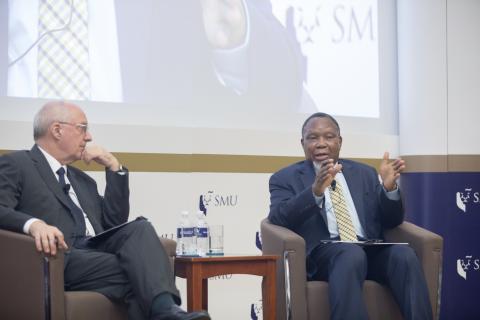
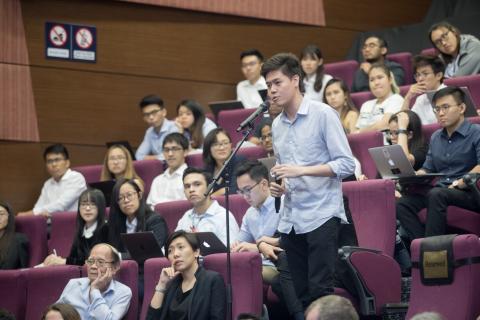
In a lively Question and Answer session moderated by SMU President Professor Arnoud De Meyer, Mr Motlanthe fielded numerous questions from an enthusiastic audience, including how to tackle the high rate of youth unemployment in South Africa, how best to impart science and technology knowledge and skills to the youths, how will immigration stimulate social and economic development in South Africa, and the hopes and aspirations of South African university students for their country.